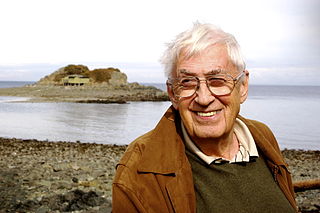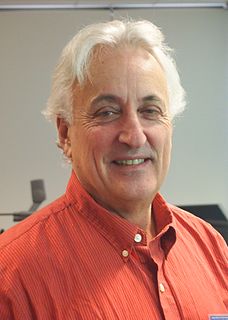
Crawford Stanley (Buzz) Holling, was a Canadian ecologist, and Emeritus Eminent Scholar and Professor in Ecological Sciences at the University of Florida. Holling was one of the conceptual founders of ecological economics .
An ecosystem is said to possess ecological stability if it is capable of returning to its equilibrium state after a perturbation or does not experience unexpected large changes in its characteristics across time. Although the terms community stability and ecological stability are sometimes used interchangeably, community stability refers only to the characteristics of communities. It is possible for an ecosystem or a community to be stable in some of their properties and unstable in others. For example, a vegetation community in response to a drought might conserve biomass but lose biodiversity.
Psychological resilience is the ability to cope mentally or emotionally with a crisis or to return to pre-crisis status quickly. Resilience exists when the person uses "mental processes and behaviors in promoting personal assets and protecting self from the potential negative effects of stressors". In simpler terms, psychological resilience exists in people who develop psychological and behavioral capabilities that allow them to remain calm during crises/chaos and to move on from the incident without long-term negative consequences. A lot of criticism of this topic comes from the fact that it is difficult to measure and test this psychological construct because resiliency can be interpreted in a variety of ways. Most psychological paradigms have their own perspective of what resilience looks like, where it comes from, and how it can be developed. Despite numerous definitions of psychological resilience, most of these definitions center around two concepts: adversity and positive adaptation. Many psychologists agree that positive emotions, social support, and hardiness can influence an individual to become more resilient.

Robert Costanza is an American/Australian ecological economist and Professor at the Institute for Global Prosperity, University College London. He is a Fellow of the Academy of the Social Sciences in Australia and a Full Member of the Club of Rome.
Adaptive capacity relates to the capacity of systems, institutions, humans and other organisms to adjust to potential damage, to take advantage of opportunities, or to respond to consequences. In the context of ecosystems, adaptive capacity is determined by genetic diversity of species, biodiversity of particular ecosystems, heterogeneous ecosystem mosaics as applied to specific landscapes or biome regions. In the context of coupled socio-ecological social systems, adaptive capacity is commonly associated with following characteristics the ability of institutions and networks to learn, and store knowledge and experience; creative flexibility in decision making, transitioning and problem solving; and the existence of power structures that are responsive and consider the needs of all stakeholders.

The Stockholm Environment Institute, or SEI, is a non-profit, independent research and policy institute specialising in sustainable development and environmental issues, with seven affiliate offices around the world. SEI works on climate change, energy systems, water resources, air quality, land-use, sanitation, food security, and trade issues with the aim to shift policy and practice towards sustainability.
Biocultural diversity is defined by Luisa Maffi, co-founder and director of Terralingua, as "the diversity of life in all its manifestations: biological, cultural, and linguistic — which are interrelated within a complex socio-ecological adaptive system." "The diversity of life is made up not only of the diversity of plants and animal species, habitats and ecosystems found on the planet, but also of the diversity of human cultures and languages." Research has linked biocultural diversity to the resilience of social-ecological systems. Certain geographic areas have been positively correlated with high levels of biocultural diversity, including those of low latitudes, higher rainfalls, higher temperatures, coastlines, and high altitudes. A negative correlation is found with areas of high latitudes, plains, and drier climates. Positive correlations can also be found between biological diversity and linguistic diversity, illustrated in the overlap between the distribution of plant diverse and language diverse zones. Social factors, such as modes of subsistence, have also been found to affect biocultural diversity.
Ecology and Society is a quarterly open access interdisciplinary academic journal published by the Resilience Alliance. It covers an array of disciplines from the natural sciences, social sciences, and the humanities concerned with the relationship between society and the life-supporting ecosystems on which human well-being ultimately depends. The journal's editors-in-chief are Marco Janssen and Lance Gunderson. C. S. Holling was the founding editor.

In ecology, resilience is the capacity of an ecosystem to respond to a perturbation or disturbance by resisting damage and recovering quickly. Such perturbations and disturbances can include stochastic events such as fires, flooding, windstorms, insect population explosions, and human activities such as deforestation, fracking of the ground for oil extraction, pesticide sprayed in soil, and the introduction of exotic plant or animal species. Disturbances of sufficient magnitude or duration can profoundly affect an ecosystem and may force an ecosystem to reach a threshold beyond which a different regime of processes and structures predominates. When such thresholds are associated with a critical or bifurcation point, these regime shifts may also be referred to as critical transitions.
Ecological threshold is the point at which a relatively small change or disturbance in external conditions causes a rapid change in an ecosystem. When an ecological threshold has been passed, the ecosystem may no longer be able to return to its state by means of its inherent resilience. Crossing an ecological threshold often leads to rapid change of ecosystem health. Ecological threshold represent a non-linearity of the responses in ecological or biological systems to pressures caused by human activities or natural processes. Critical load, regime shift, critical transition and tipping point are examples of other closely related terms.
Resilience, resilient, resiliency, or variation, may refer to:
Brian Harrison Walker is a scientist specialized in ecological sustainability and resilience in socio-ecological systems.

The Potsdam Institute for Climate Impact Research is a German government-funded research institute addressing crucial scientific questions in the fields of global change, climate impacts, and sustainable development. Ranked among the top environmental think tanks worldwide, it is one of the leading research institutions and part of a global network of scientific and academic institutions working on questions of global environmental change. It is a member of the Leibniz Association, whose institutions perform research on subjects of high relevance to society.
A social-ecological system consists of 'a bio-geo-physical' unit and its associated social actors and institutions. Social-ecological systems are complex and adaptive and delimited by spatial or functional boundaries surrounding particular ecosystems and their context problems.

Prof. Carl Folke, is a trans-disciplinary environmental scientist and a member of the Royal Swedish Academy of Sciences. He is a specialist in economics, resilience, and social-ecological systems. He is Science Director of the Stockholm Resilience Centre and the Director of the Beijer Institute of Ecological Economics of the Royal Swedish Academy of Sciences.

In the fields of engineering and construction, resilience is the ability to absorb or avoid damage without suffering complete failure and is an objective of design, maintenance and restoration for buildings and infrastructure, as well as communities. A more comprehensive definition is that it is the ability to respond, absorb, and adapt to, as well as recover in a disruptive event. A resilient structure/system/community is expected to be able to resist to an extreme event with minimal damages and functionality disruptions during the event; after the event, it should be able to rapidly recovery its functionality similar to or even better than the pre-event level.

Climate resilience is defined as the "capacity of social, economic and ecosystems to cope with a hazardous event or trend or disturbance". This is done by "responding or reorganising in ways that maintain their essential function, identity and structure while also maintaining the capacity for adaptation, learning and transformation". The key focus of increasing climate resilience is to reduce the climate vulnerability that communities, states, and countries currently have with regards to the many effects of climate change. Currently, climate resilience efforts encompass social, economic, technological, and political strategies that are being implemented at all scales of society. From local community action to global treaties, addressing climate resilience is becoming a priority, although it could be argued that a significant amount of the theory has yet to be translated into practice. Despite this, there is a robust and ever-growing movement fueled by local and national bodies alike geared towards building and improving climate resilience.
Social ecology studies relationships between people and their environment, often the interdependence of people, collectives and institutions. Evolving out of biological ecology, human ecology, systems theory and ecological psychology, social ecology takes a “broad, interdisciplinary perspective that gives greater attention to the social, psychological, institutional, and cultural contexts of people-environment relations than did earlier versions of human ecology.” The concept has been employed to study a diverse array of social problems and policies within the behavioural and social sciences.
Ecological grief, also known as climate grief, refers to the sense of loss that arises from experiencing or learning about environmental destruction or climate change. Environmental grief can be defined as "the grief reaction stemming from the environmental loss of ecosystems by natural and man-made events." Another definition is "the grief felt in relation to experienced or anticipated ecological losses, including the loss of species, ecosystems, and meaningful landscapes due to acute or chronic environmental change." For example, scientists witnessing the decline of Australia's Great Barrier Reef report experiences of anxiety, hopelessness, and despair.
Supply chain resilience is "the adaptive capability of the supply chain to prepare for unexpected events, respond to disruptions, and recover from them by maintaining continuity of operations at the desired level of connectedness and control over structure and function".







